Analysis of Changes in the Accounting Profession and its Relevance
VerifiedAdded on 2023/06/03
|5
|882
|166
Report
AI Summary
This report analyzes the evolving landscape of the accounting profession, emphasizing the impact of financial scandals on public trust and the subsequent regulatory responses. It identifies key user groups of accounting information, including internal (management, employees) and external stakeholders (shareholders, regulators, lenders), and explains their specific needs. The report highlights the shift towards a highly regulated environment, driven by the enactment of laws like the Sarbanes-Oxley Act and the adoption of International Financial Reporting Standards (IFRS) to promote transparency and accountability. It assesses the effectiveness of these measures in preventing accounting scandals and fostering discipline within the profession. The report references several academic sources to support its claims.
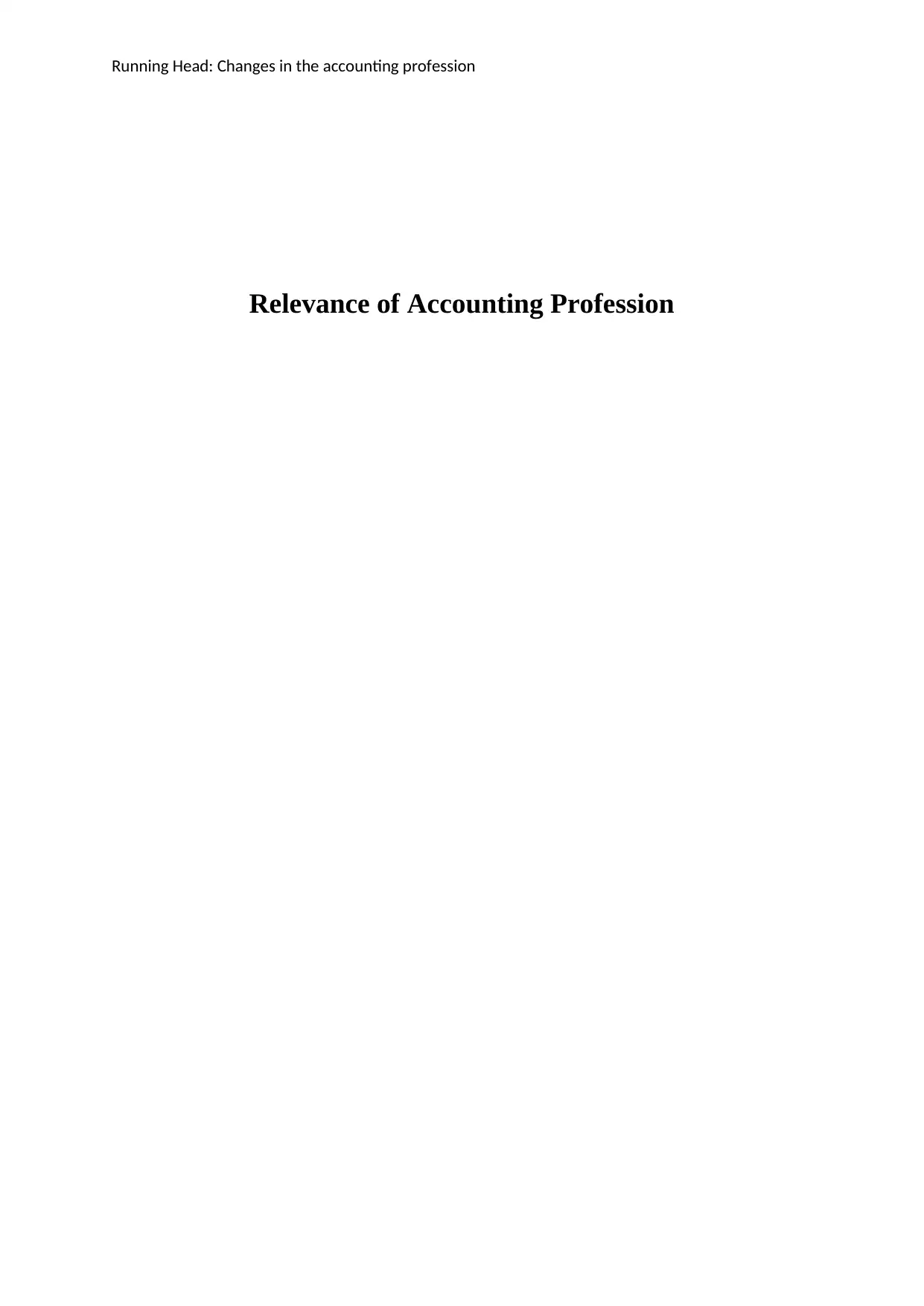
Running Head: Changes in the accounting profession
Relevance of Accounting Profession
Relevance of Accounting Profession
Paraphrase This Document
Need a fresh take? Get an instant paraphrase of this document with our AI Paraphraser
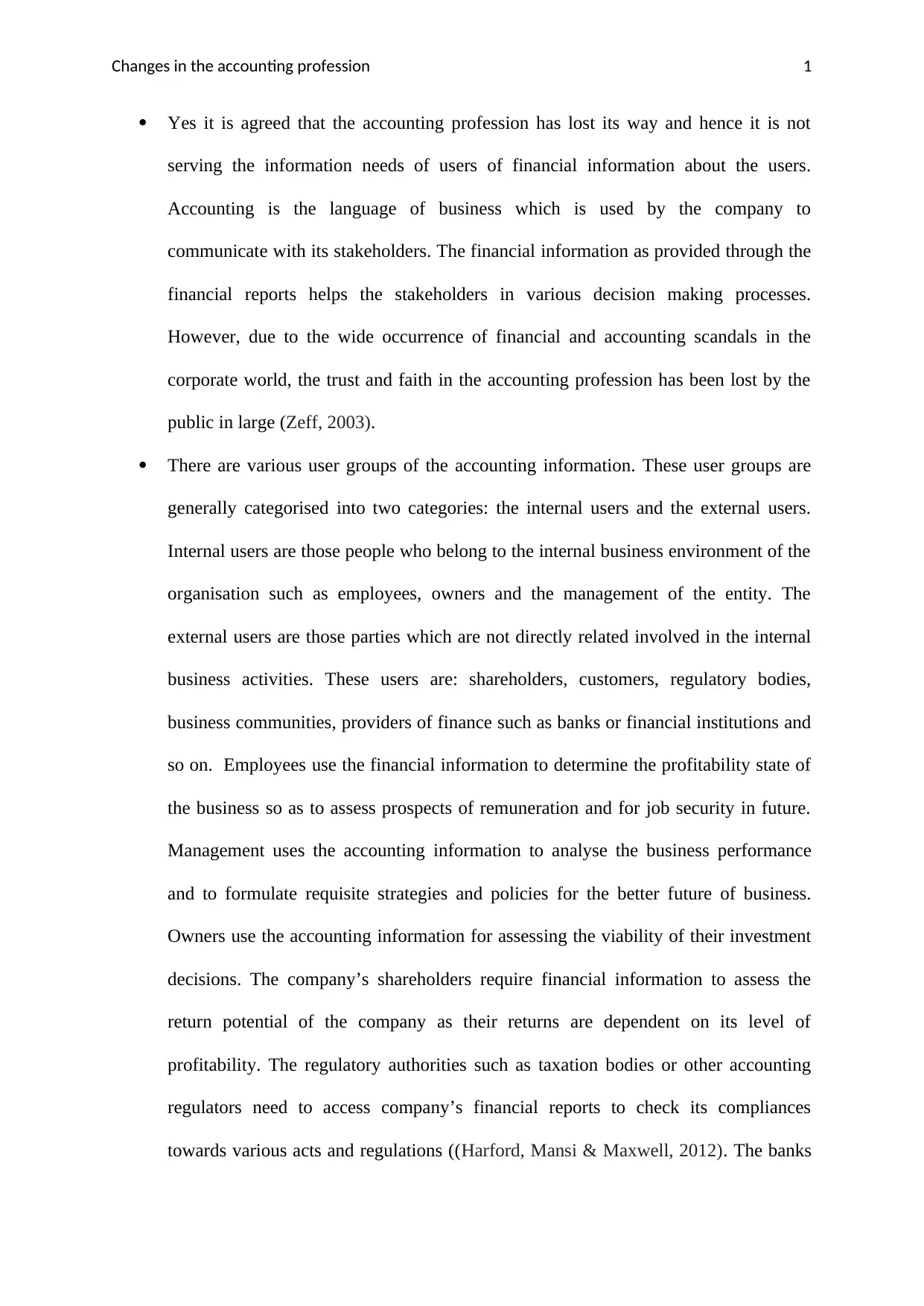
Changes in the accounting profession 1
Yes it is agreed that the accounting profession has lost its way and hence it is not
serving the information needs of users of financial information about the users.
Accounting is the language of business which is used by the company to
communicate with its stakeholders. The financial information as provided through the
financial reports helps the stakeholders in various decision making processes.
However, due to the wide occurrence of financial and accounting scandals in the
corporate world, the trust and faith in the accounting profession has been lost by the
public in large (Zeff, 2003).
There are various user groups of the accounting information. These user groups are
generally categorised into two categories: the internal users and the external users.
Internal users are those people who belong to the internal business environment of the
organisation such as employees, owners and the management of the entity. The
external users are those parties which are not directly related involved in the internal
business activities. These users are: shareholders, customers, regulatory bodies,
business communities, providers of finance such as banks or financial institutions and
so on. Employees use the financial information to determine the profitability state of
the business so as to assess prospects of remuneration and for job security in future.
Management uses the accounting information to analyse the business performance
and to formulate requisite strategies and policies for the better future of business.
Owners use the accounting information for assessing the viability of their investment
decisions. The company’s shareholders require financial information to assess the
return potential of the company as their returns are dependent on its level of
profitability. The regulatory authorities such as taxation bodies or other accounting
regulators need to access company’s financial reports to check its compliances
towards various acts and regulations ((Harford, Mansi & Maxwell, 2012). The banks
Yes it is agreed that the accounting profession has lost its way and hence it is not
serving the information needs of users of financial information about the users.
Accounting is the language of business which is used by the company to
communicate with its stakeholders. The financial information as provided through the
financial reports helps the stakeholders in various decision making processes.
However, due to the wide occurrence of financial and accounting scandals in the
corporate world, the trust and faith in the accounting profession has been lost by the
public in large (Zeff, 2003).
There are various user groups of the accounting information. These user groups are
generally categorised into two categories: the internal users and the external users.
Internal users are those people who belong to the internal business environment of the
organisation such as employees, owners and the management of the entity. The
external users are those parties which are not directly related involved in the internal
business activities. These users are: shareholders, customers, regulatory bodies,
business communities, providers of finance such as banks or financial institutions and
so on. Employees use the financial information to determine the profitability state of
the business so as to assess prospects of remuneration and for job security in future.
Management uses the accounting information to analyse the business performance
and to formulate requisite strategies and policies for the better future of business.
Owners use the accounting information for assessing the viability of their investment
decisions. The company’s shareholders require financial information to assess the
return potential of the company as their returns are dependent on its level of
profitability. The regulatory authorities such as taxation bodies or other accounting
regulators need to access company’s financial reports to check its compliances
towards various acts and regulations ((Harford, Mansi & Maxwell, 2012). The banks
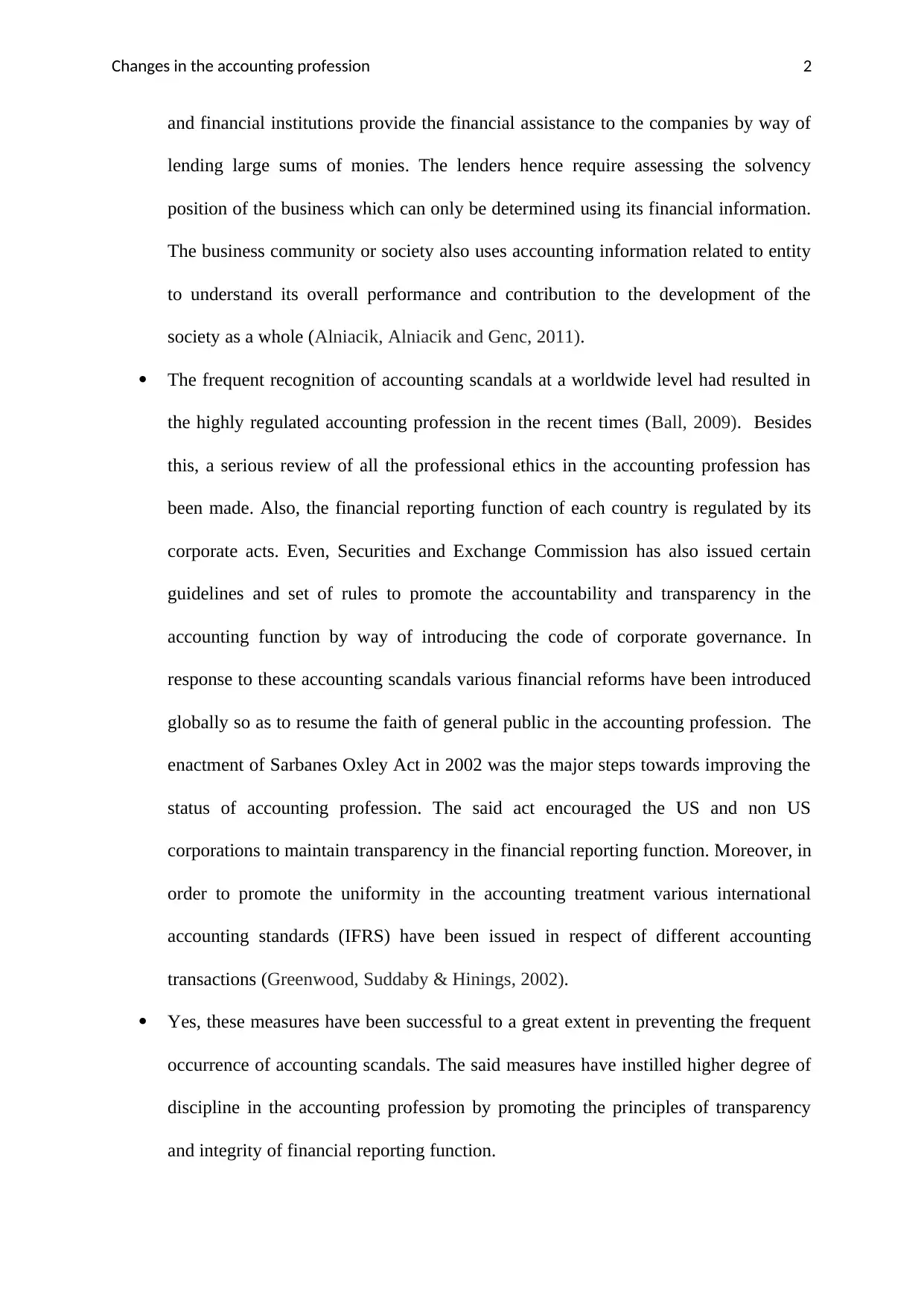
Changes in the accounting profession 2
and financial institutions provide the financial assistance to the companies by way of
lending large sums of monies. The lenders hence require assessing the solvency
position of the business which can only be determined using its financial information.
The business community or society also uses accounting information related to entity
to understand its overall performance and contribution to the development of the
society as a whole (Alniacik, Alniacik and Genc, 2011).
The frequent recognition of accounting scandals at a worldwide level had resulted in
the highly regulated accounting profession in the recent times (Ball, 2009). Besides
this, a serious review of all the professional ethics in the accounting profession has
been made. Also, the financial reporting function of each country is regulated by its
corporate acts. Even, Securities and Exchange Commission has also issued certain
guidelines and set of rules to promote the accountability and transparency in the
accounting function by way of introducing the code of corporate governance. In
response to these accounting scandals various financial reforms have been introduced
globally so as to resume the faith of general public in the accounting profession. The
enactment of Sarbanes Oxley Act in 2002 was the major steps towards improving the
status of accounting profession. The said act encouraged the US and non US
corporations to maintain transparency in the financial reporting function. Moreover, in
order to promote the uniformity in the accounting treatment various international
accounting standards (IFRS) have been issued in respect of different accounting
transactions (Greenwood, Suddaby & Hinings, 2002).
Yes, these measures have been successful to a great extent in preventing the frequent
occurrence of accounting scandals. The said measures have instilled higher degree of
discipline in the accounting profession by promoting the principles of transparency
and integrity of financial reporting function.
and financial institutions provide the financial assistance to the companies by way of
lending large sums of monies. The lenders hence require assessing the solvency
position of the business which can only be determined using its financial information.
The business community or society also uses accounting information related to entity
to understand its overall performance and contribution to the development of the
society as a whole (Alniacik, Alniacik and Genc, 2011).
The frequent recognition of accounting scandals at a worldwide level had resulted in
the highly regulated accounting profession in the recent times (Ball, 2009). Besides
this, a serious review of all the professional ethics in the accounting profession has
been made. Also, the financial reporting function of each country is regulated by its
corporate acts. Even, Securities and Exchange Commission has also issued certain
guidelines and set of rules to promote the accountability and transparency in the
accounting function by way of introducing the code of corporate governance. In
response to these accounting scandals various financial reforms have been introduced
globally so as to resume the faith of general public in the accounting profession. The
enactment of Sarbanes Oxley Act in 2002 was the major steps towards improving the
status of accounting profession. The said act encouraged the US and non US
corporations to maintain transparency in the financial reporting function. Moreover, in
order to promote the uniformity in the accounting treatment various international
accounting standards (IFRS) have been issued in respect of different accounting
transactions (Greenwood, Suddaby & Hinings, 2002).
Yes, these measures have been successful to a great extent in preventing the frequent
occurrence of accounting scandals. The said measures have instilled higher degree of
discipline in the accounting profession by promoting the principles of transparency
and integrity of financial reporting function.
⊘ This is a preview!⊘
Do you want full access?
Subscribe today to unlock all pages.

Trusted by 1+ million students worldwide
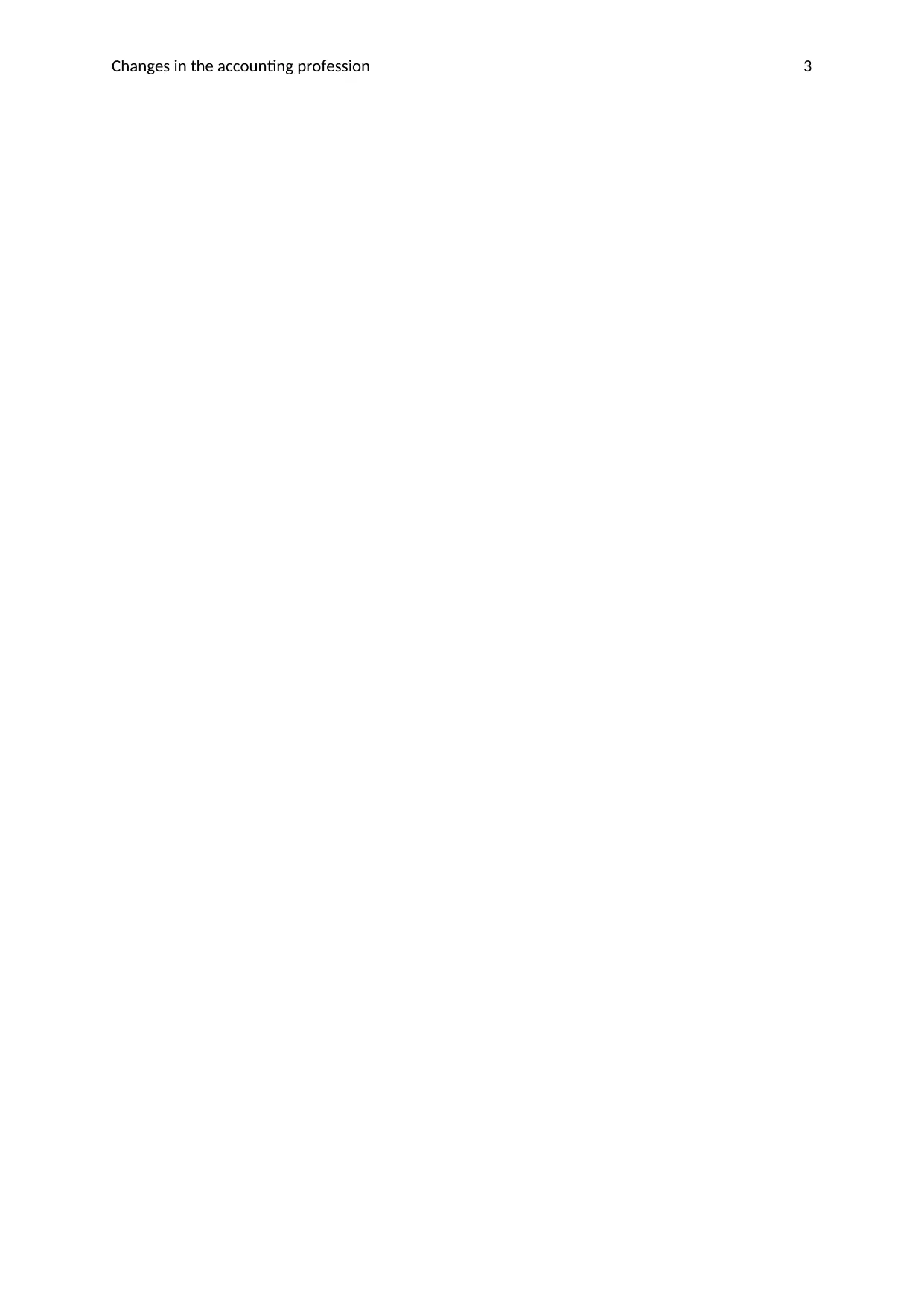
Changes in the accounting profession 3
Paraphrase This Document
Need a fresh take? Get an instant paraphrase of this document with our AI Paraphraser
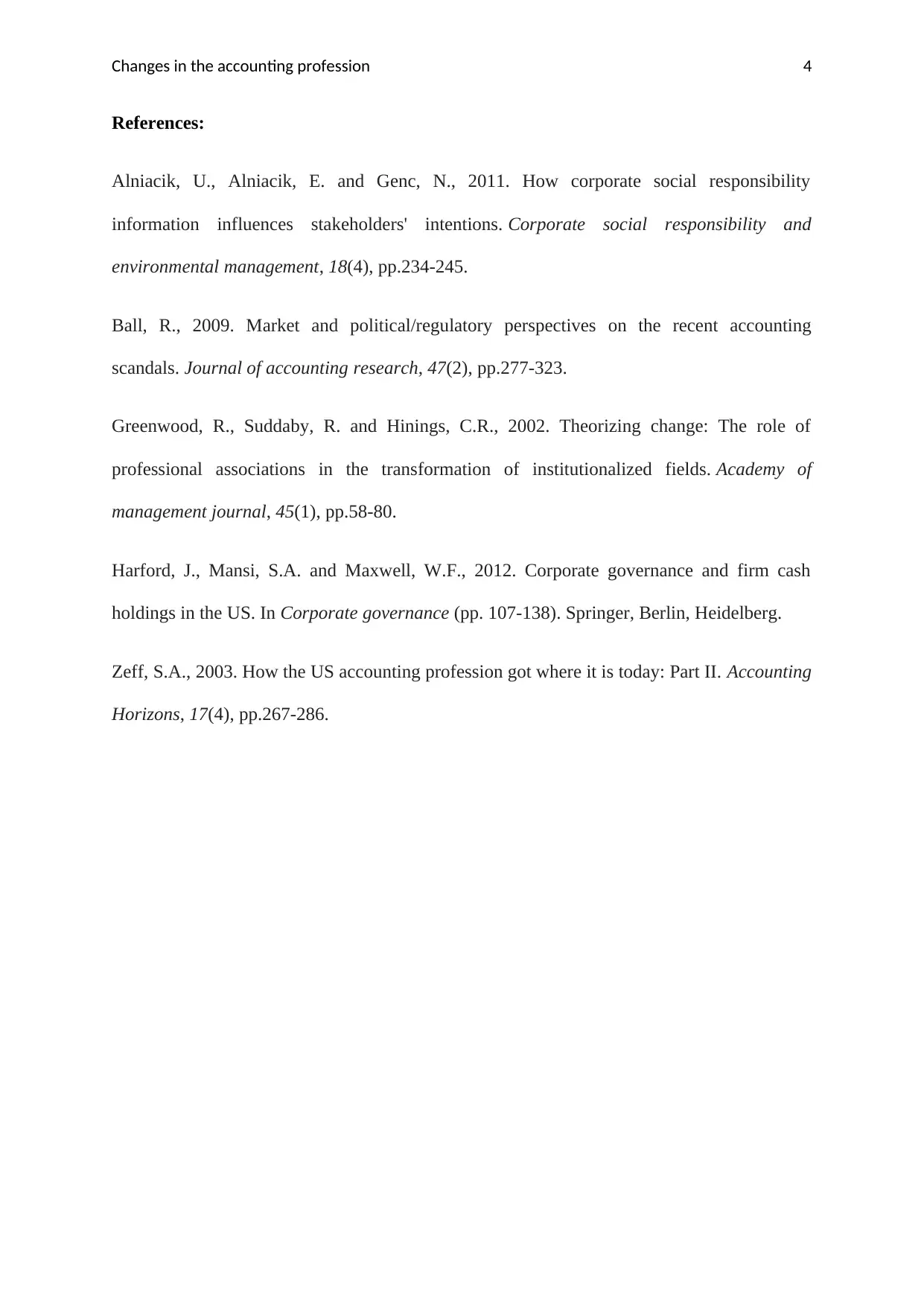
Changes in the accounting profession 4
References:
Alniacik, U., Alniacik, E. and Genc, N., 2011. How corporate social responsibility
information influences stakeholders' intentions. Corporate social responsibility and
environmental management, 18(4), pp.234-245.
Ball, R., 2009. Market and political/regulatory perspectives on the recent accounting
scandals. Journal of accounting research, 47(2), pp.277-323.
Greenwood, R., Suddaby, R. and Hinings, C.R., 2002. Theorizing change: The role of
professional associations in the transformation of institutionalized fields. Academy of
management journal, 45(1), pp.58-80.
Harford, J., Mansi, S.A. and Maxwell, W.F., 2012. Corporate governance and firm cash
holdings in the US. In Corporate governance (pp. 107-138). Springer, Berlin, Heidelberg.
Zeff, S.A., 2003. How the US accounting profession got where it is today: Part II. Accounting
Horizons, 17(4), pp.267-286.
References:
Alniacik, U., Alniacik, E. and Genc, N., 2011. How corporate social responsibility
information influences stakeholders' intentions. Corporate social responsibility and
environmental management, 18(4), pp.234-245.
Ball, R., 2009. Market and political/regulatory perspectives on the recent accounting
scandals. Journal of accounting research, 47(2), pp.277-323.
Greenwood, R., Suddaby, R. and Hinings, C.R., 2002. Theorizing change: The role of
professional associations in the transformation of institutionalized fields. Academy of
management journal, 45(1), pp.58-80.
Harford, J., Mansi, S.A. and Maxwell, W.F., 2012. Corporate governance and firm cash
holdings in the US. In Corporate governance (pp. 107-138). Springer, Berlin, Heidelberg.
Zeff, S.A., 2003. How the US accounting profession got where it is today: Part II. Accounting
Horizons, 17(4), pp.267-286.
1 out of 5
Related Documents
Your All-in-One AI-Powered Toolkit for Academic Success.
+13062052269
info@desklib.com
Available 24*7 on WhatsApp / Email
![[object Object]](/_next/static/media/star-bottom.7253800d.svg)
Unlock your academic potential
Copyright © 2020–2026 A2Z Services. All Rights Reserved. Developed and managed by ZUCOL.





